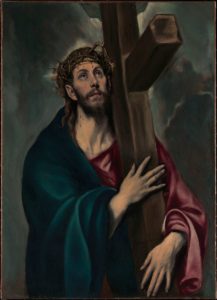“Who do you say that I am?”

It was a very interesting day. We were having a somewhat vociferous staff discussion about where to put the trash cans in the new church, when we got a call to turn on the TV, which we did, just in time to see the second plane hit the second of the World Trade Center Towers. We watched in stunned and sobbing silence. The Trade Center had a special meaning for me as it was the location of one of the last meals that I had with my dad. He was dropping me off for school and decided to take me to Windows on the World, the restaurant at the top of the North Tower. That tower was already ablaze, having been the first one hit. We watched the collapses and then moved over to the church for the 10am Mass. Word had spread, the Mass was heavily attended, and much prayer was offered. We held an additional Mass that night, which was also heavily attended. Twenty years ago, things changed for us.
What did not change? The Lord Jesus asked His disciples, “Who do you say that I am?” He asks us the same question today, even as He asked us the same question twenty years ago. In the face of great disaster and suffering, confusion and fear, who do we say that He is? There is a slogan that apparently came out of the World Wars: “There are no atheists in foxholes.” Clergy across denominations noted a big surge in church attendance after the 9/11 attacks. The United States had been attacked. In addition to what happened in New York, Washington, D.C., and Pennsylvania, skyscrapers across the country were evacuated, the entire passenger fleet was grounded, the Stock Market suspended. There was great fear and uncertainty.
When things like this happen, He asks, “Who do you say that I am?” There are multiple options. Disasters that bring about a surge of church attendance speak to a “paramedic” relationship with Jesus, i.e., you call Him in emergencies. The response is not wrong, it is just insufficient–who has a deep and personal relationship with their paramedic? The Psalmist echoes this position: “The cords of death encompassed me; the snares of the netherworld seized upon me; I fell into distress and sorrow, and I called upon the name of the LORD, ‘O LORD, save my life!’ ” But we know that for the Psalmist, it is more than a “paramedic” relationship. For him it is a way of life: “I shall walk before the Lord in the land of the living.”
But in “normal life,” what is our relationship with Him like? Do we have the intimate relationship with Him that brings meaning and grace to our lives? We are also moved to ask this during diffi- cult times. In the first reading, we hear the suffering servant pro- claiming that even in the midst of His great personal suffering, He will remain faithful. The Lord Jesus invites us always to follow His example. He knew great sorrow and suffering but always faced it with hope and great trust in His Father and we celebrate His triumph still.
Now is such a time when many are suffering on many levels and for many reasons. Do we imitate the King, Who tells us, “I have set my face like flint, knowing that I shall not be put to shame. He is near who upholds my right”? If we do, imitating Him in choosing to trust Him and His Father and Their Holy Spirit, then we too shall not be put to shame. We will be able to display that faith that the second reading speaks of, trusting the King and doing His will, even in the midst of crazy and uncertain and, frankly, for many, very painful times. We can do this if we heed His directions to us: “Whoever wishes to come after Me must deny himself, take up his cross, and follow Me.” He promises to be with us with all the assistance we need to meet our challenges with victory.
The King is absolutely faithful and filled with love for us, the sheep of His flock. Let us cling to Him during this difficult time, always remembering that He Who is in us is greater than anything we may face. Even so, come, Lord Jesus, come! We trust in You! – Fr. Ed Fride
Read More from Fr. Ed Fride
Third Sunday of Easter, 2022
“I will praise You, Lord, for You have rescued me.” The great Octave of Easter concluded with Divine Mercy Sunday, one of Pope St. John Paul the Great’s many gifts to the Church. During these last few weeks we have been graphically reminded of the gifts to us of the Eucharistic Lord, of the ... Read more

